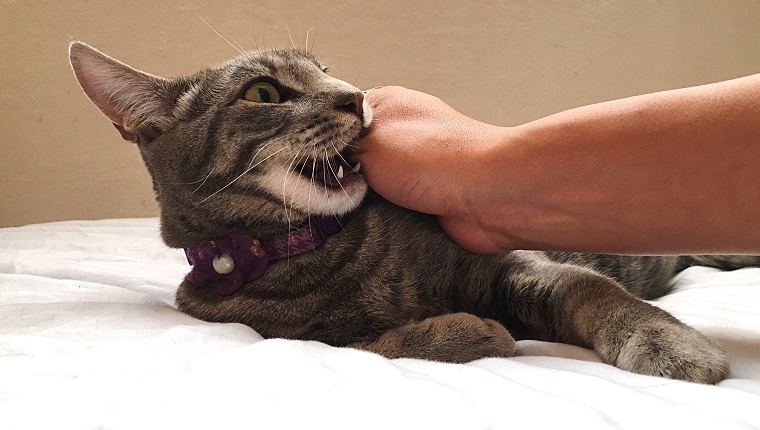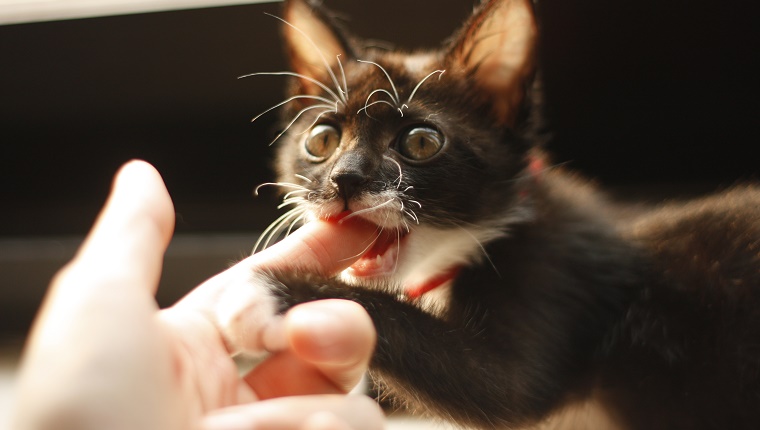
One of our CatTime readers has a cat who likes to playfully bite, and she wonders if cat bites are dangerous. She writes:
Dear Tabby,
I have a cat that likes to playfully nip my hand, but sometimes the bites get a little too hard. We are trying to work on correcting the behavior, but I was wondering — are cat bites dangerous?
Luckily my cat hasn’t broken the skin with her teeth yet, but I’ve heard cat bites can be very serious. A friend of mine said he got tetanus from a cat bite once.
If I am bitten severely by my cat, should I be worried? What sort of first aid should I know to treat the wound?
Sincerely,
Cat Harm On My Palm — Emergency Response
Dear Tabby Has The Answer!
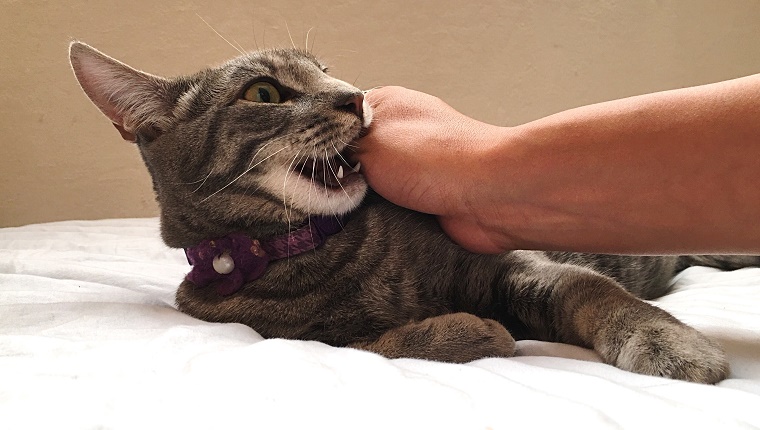
Well C.H.O.M.P.E.R., I’m glad you are working on nipping the biting in the bud because cat bites, especially to the hand, often are serious.
In fact, a shocking 80 percent of cat bites to the hand, even those that don’t bleed, become infected. The hand is one of the worst places to get bitten because the tendons and joints are so close to the surface of the skin and can be harder to treat if bacteria gets into the wound.
The National Institute for Health and Care Excellence (NICE) says that a cat bite can even lead to permanent disability if not treated properly.
Let’s get the scariest statistics and side effects out of the way, first. Even though dogs are responsible for 60 to 90 percent of bites from pets, cat bites are twice as likely to become infected since they puncture deep with their sharp teeth, injecting bacteria further into the wound.
In the United States, about 400,000 cat bites occur every year with 66,000 requiring a trip to the emergency room.
Three out of four bite infections are because of a bacteria called Pasteurella Multocida found in the mouths of cats and dogs which can cause cellulitis if it goes untreated. Most people recover from cellulitis, but if it is severe enough it can spread in the body and be life-threatening.
What’s The Worst That Could Happen?

Here are the worst case scenarios because I’m sure you’re just dying to know.
Infections in the hand can destroy cartilage and prevent your fingers from moving in the future. Chronic infection can destroy joints and bones and lead to amputation. The bacteria can spread to the rest of the body and cause sepsis.
Other rare complications that only usually occur when the immune system is compromised include bone or heart infections and meningitis. And of course, rabies, tetanus, and a number of transmittable disease can occur if the cat is a stray or not familiar to you.
It wouldn’t hurt to make sure your tetanus shot is up to date. I also know someone who got tetanus from a cat bite.
Stay Calm And Focus On Prevention
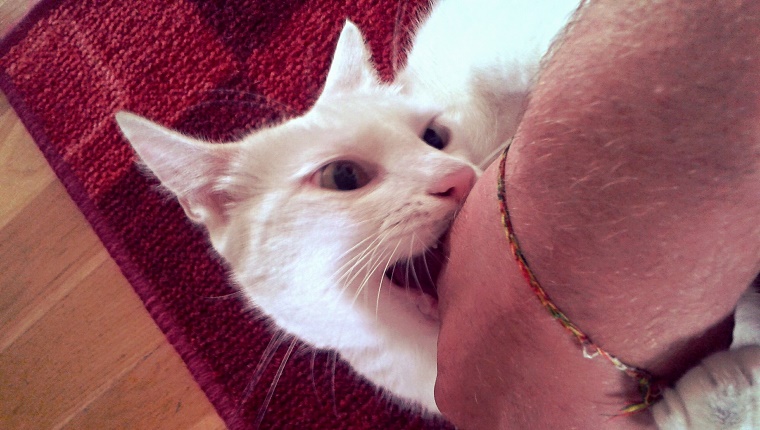
Do you feel better knowing the worst that can happen? Probably not, but don’t shun cats as terrifying, bitey beasties just yet. Four out of five bites to anywhere on the body don’t require much medical attention, and the hand is just a particularly problematic place to be bitten.
You can reduce your risk of being bitten at all by understanding why cats bite in the first place, including their hunting and play instincts.
Avoid picking up or reaching for cats you don’t know, especially strays. Look for signs of anxiety or stress in your cat and pay attention.
If you do get a bite, always wash it thoroughly, no matter where on your body it occurs or how deep the wound goes.
How To Treat A Cat Bite
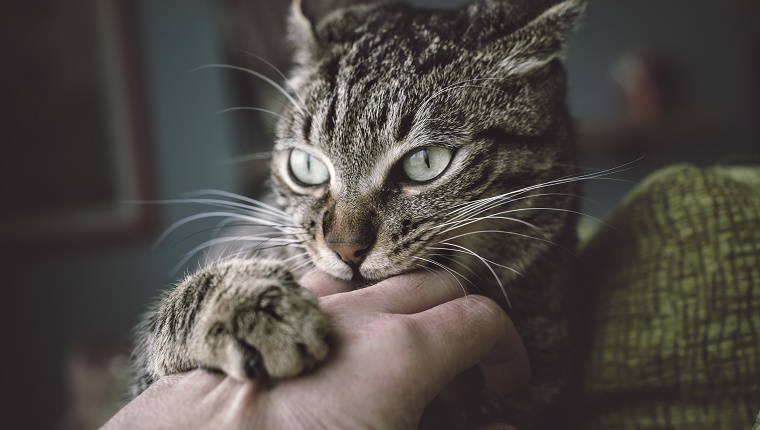
Here are some first aid tips for dealing with a bite. Wash the wound with mild soap and rinse with running water. Pat it dry and apply antibiotic ointment before covering it with a clean bandage. Put some ice on it to reduce swelling, put pressure on the wound, and elevate it.
Get to a doctor as soon as possible. Because of the likelihood of infection from cat bites in particular, you should always see a doctor for these kinds of wounds.
You’ll likely be put on an antibiotic regimen, and depending on when you last got your tetanus shot or if your doctor thinks a rabies shot is necessary, you may be in for a round of vaccinations.
Don’t Panic
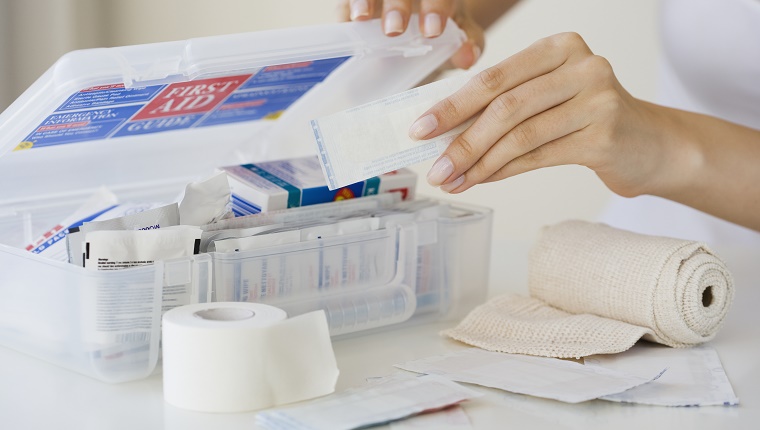
The main thing to remember, C.H.O.M.P.E.R., is not to panic. If you treat the wound quickly and give it the medical attention it deserves, it’s unlikely that you’ll have any serious complications.
Being prepared for a bite is part of being a responsible cat parent, and as cat lovers we’ll just keep on showering our fur babies with praise and adoration whether they nip or not.
Love is never having to say your sorry, and we don’t expect any apologies from our feline companions.
Does your cat ever give you a playful bite? Have you ever had to treat a cat bite wound? Let us know in the comments below!
